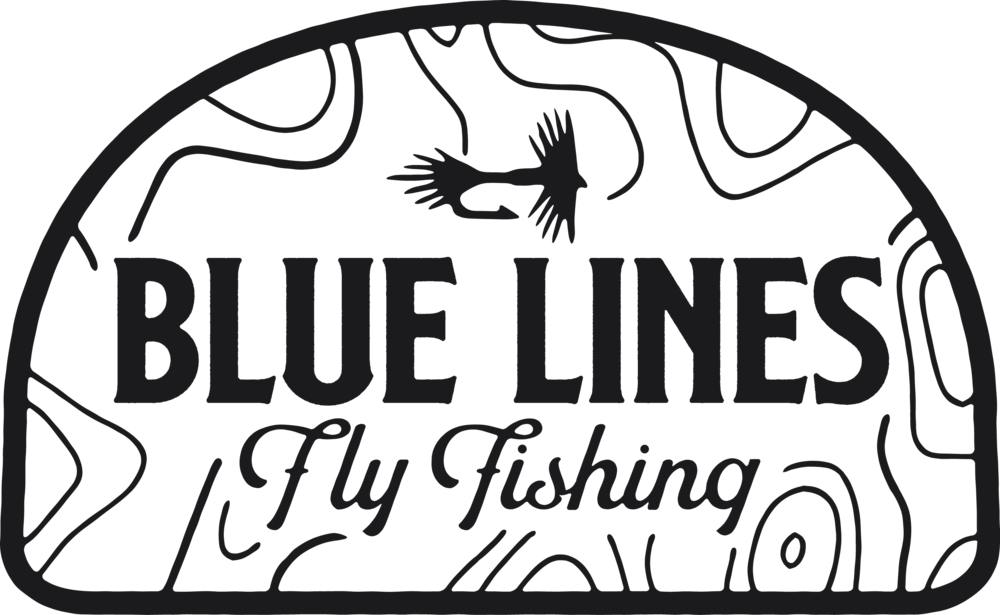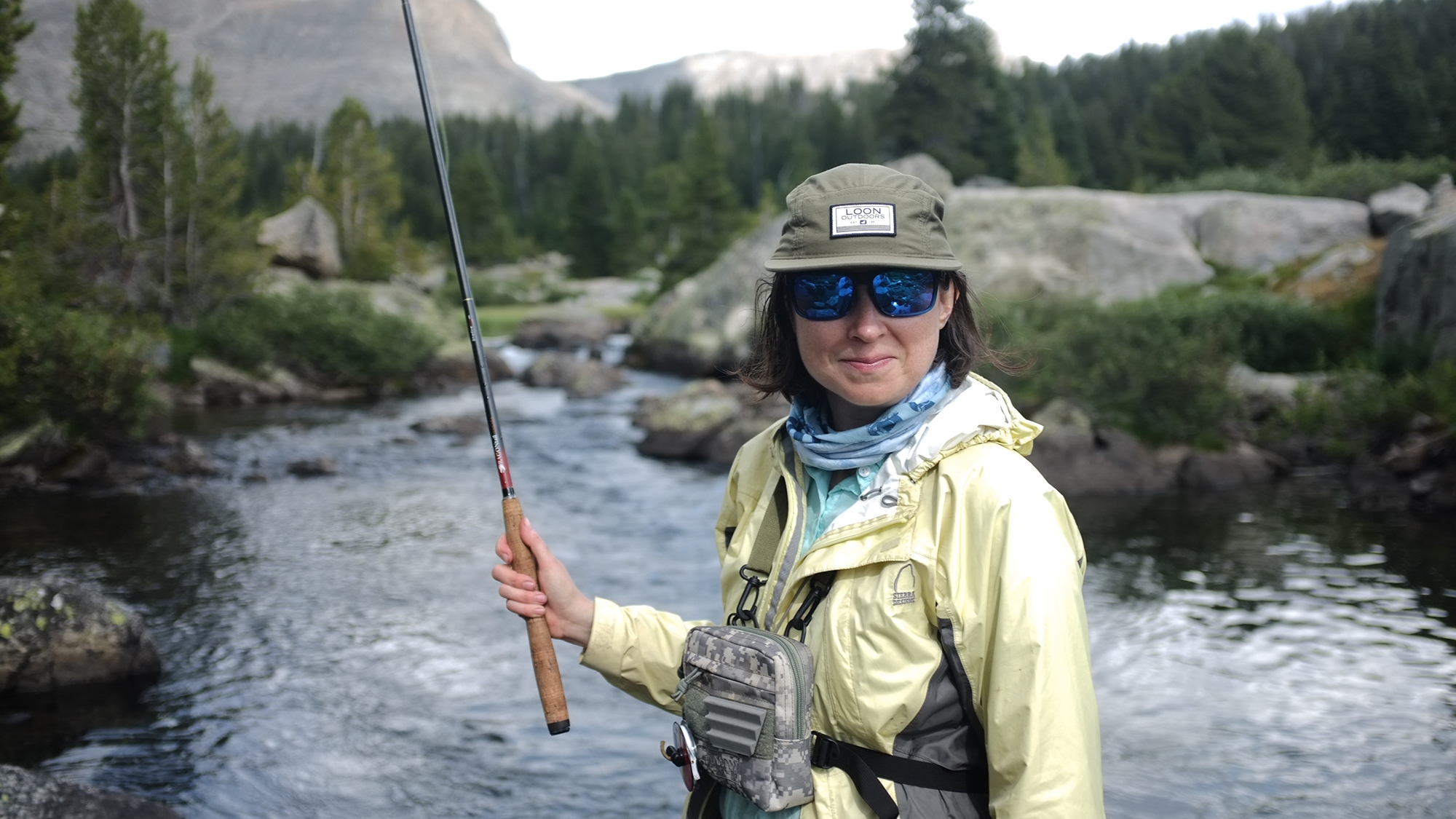by Jeffrey Stutsman
The ridgeline is a scar. An ugly crosshatch of bleached, weathered pine trunks, stripped of their branches, burned and dead. Underneath, a lush green carpet thrives in the sunlight, but it is still too soon for new trees to have grown back. It is a tombstone. Things died here. But across the valley an opposing ridgeline rises like mirror to the past: its reflection is lush green and unsinged. Between them lies a perfect freestone stream, a natural firebreak that halted the conflagration and also holds innumerable wild brooktrout. It feels like a metaphor: life and death divided by vigorous beauty, and wildness, and abandon.
You’ve been hiking for three days, your legs are tired, your socks are soggy and scratchy because you’ve been wet wading in them every day. Your girlfriend is looping level line to her tenkara rod and your dog is asleep in the mottled shadow of a willow. You are releasing a chunky ten-inch brook trout back into the back eddy you stole him from. His belly is bright orange because spawning season begins almost as soon as the snow melts at this elevation. You laugh because the trout is much bigger and prettier than he should be, and he took your first cast, and it is so rarely that easy.
The first day had been different. Myriad work emergencies delayed your start by a day and a half, but two of your friends had to bail altogether, so your slightly belated arrival actually feels like a triumph even though your shorter, amended route pulls you away from the best chance at your first golden trout. In the evening, you arrived at a lake filled with large fish but found them to be impossibly selective. You ran through fly patterns like it was a blue-ribbon tailwater and caught only a handful of trout. But they were gorgeous and strong and you watched your best friend catch her first cutthroat, a sixteen inch Yellowstone. She was giddy when she released it. And her voice echoed across the lake when she cried “That was my first cutthroat!”
You walk upstream with your packs on, casting to likely eddies and pools and seams. Brook trout rise from nearly every likely lie, smashing each pattern you try: hoppers, caddis flies, emergers, nymphs, and soft-hackle wets. In contrast to the finicky lake fish it is a miraculous pallet cleanser. You revel in their beauty. Every brook trout is different. They are speckled and green, or lavender, or nearly black, or pale and so washed out that it takes a minute to recognize them. Some are small, but most are eight to twelve inches and you catch and release them until your hands dry and crack. You have to keep hiking in order to get to a high-alpine lake before dark so you stop to fish only the most beautiful stretches. Wild brook trout are made more from poetry than challenge, so it’s best to find them in tumbling meadows where you can’t help but listen.
The trail fades and disappears and you cross a pile of what is almost certainly mountain lion scat a half mile from your campsite and try not to think about it as you zip yourself up in a silnylon burrito. When you fall asleep at treeline, nestled among stunted krummholz, with a heavy wind ruffling your tent, you have caught more brookies than could reasonably be counted, if you were in the habit of counting trout in the first place, but you have seen no goldens. You wake up early enough to watch the sun rise over jagged mountains while the water for your instant coffee slowly creeps to a boil. You see no one else for two days; the wilderness begins to feel like it is your own.
You begin calling your dog Truffle Pig after he digs a hole to curl up in while you fish, neatly piling about three pounds of dirt onto and into your girlfriend’s backpack. You realize that his hind legs look surprisingly like chicken thighs and you begin to crave fried chicken so much that you worry you’d bread and fry him if you’d brought enough oil.
The days wear on and you gently release foot-long brookies back into their lakes and remember how delicious they are and how sad it makes you to kill them, so you instead you eat freeze-dried dinners out of bags and lament the fact that you brought neither the aluminum foil nor the conviction to eat trout this time. You wade through fields of flowering herbs that you cannot identify and so do not eat, though they smell wonderfully like thyme.
You think about food a lot.
It takes a little while to shed the previous few months of work and detritus but every day you feel a little more human--a little more normal. By the sixth day, the impending return to civilization begins to feel almost welcome, buoyed by the promise of a hot shower and clean, dry socks, and fried chicken.
On your last night in the Wind River Range, you camp at a large, beautiful lake. The solitude of the high-alpine is gone but you meet a nice gentleman from Utah and trade stories about routes and fish. You’d found an unconvincing, fifteen-year-old report that there were golden trout in the lake, so after dinner, you hike down to the shoreline where you see intermittent rises blinking like radar pings.
Wind ruffles the surface of the water and you cast your five-weight as delicately as possible. Noses appear near your fly but you can’t see any bugs and after a handful of acceptable casts to the right spots go ignored, you begin changing flies, smaller, darker, smaller still, lighter, and then even smaller. In the fading light, as small bats begin buzzing the surface of the lake, you tie on a size 22 cream-colored WD-50 (the tiniest fly you bothered to bring), and shoot it out fifteen feet from the shore. Something inhales it just as it lands and you sharply suck air into your lungs before setting the hook. As you guide the fish in you see the contrast of bright red and pale gold and you actually stop breathing until you scoop it up in a makeshift net. You are alone on the shore and your first golden trout is swimming around in your favorite hat. It is small, less than ten inches, but its colors mirror the fading sunset and it is perfect.














